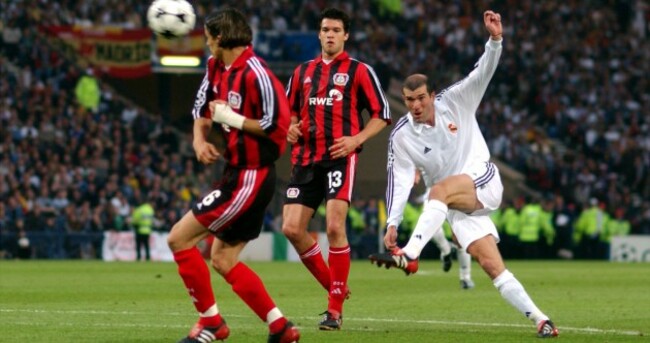1. Puskas and di Stefano work their magic
Real Madrid 7-3 Eintracht Frankfurt (1960)
In terms of drama, Glasgow 1960 might not quite measure up to Barcelona 1999 or Istanbul 2005 – but in terms of the footballing quality on display, Real Madrid’s seven-goal demolition of Eintracht Frankfurt is without parallel.
Madrid came into the game on the back of four successive victories in the contest and, with their front-line led by the world-class pairing of Alfredo di Stefano and Ferenc Puskas, it is easy to see why.
Puskas’ personal road to the final is an interesting one. Having accused the West German national side of doping during the 1954 World Cup, the Hungarian superstar was forced to make a written apology for the comments before the German FA would allow Frankfurt to participate in the game.
Puskas wrote the letter before proceeding to make Frankfurt wish they had stayed at home, combining beautifully with di Stefano to bag four of Madrid’s seven goals in what can be generously described as a comprehensive victory.
Not to be outdone, the Argentinian chipped in with a hat-trick of his own, alternating his goal-scoring with some stunning moments of creative genius as he came into his own as the focal point of the Spanish side’s wave of attacks.
2. The “Lisbon Lions” roar
Celtic 2-1 Inter Milan (1967)
As the godfather of catenaccio, Inter Milan boss Helenio Herrera must have been overjoyed at the opening exchanges of the 1967 European Cup final in Lisbon.
The tactical system which he had perfected was designed to copper-fasten defences and minimize the amount of goals conceded, making it ideal for the protection of a 1-0 lead regardless of the occasion.
If anyone doubted catenaccio’s effectiveness on the big stage, the European Cups of 1964 and 1965, resting proudly in the Nerazzurri‘s trophy cabinet, begged to differ.
So, when Sandro Mazzola gave Herrera’s men an early lead with seventh-minute spot kick, the Inter boss fancied his chances of claiming a third continental success.
His opposite number, Jock Stein, had come well-prepared however, deploying his men in adventurous 4-2-4 formation with the aim of outflanking Inter’s rigid defensive line.
In the 62nd minute, it worked. As six Celtic attackers flooded the Inter box, Tommy Gemmell drifted into a pocket 20 yards from goal, perfectly positioned to hammer the ball into the bottom corner when right-full Jim Craig pulled it back to him.
From that point on, Inter’s defensive mentality, so often the side’s saviour in the past, became an unbearable weight.
The foundations for Stevie Chalmers’ late winner were laid long before he squirreled the ball past Sarti in the 86th minute, and the legend of Lisbon was born.
3. Savicevic’s lob
AC Milan 4-0 Barcelona (1994)
On the big stage, there is a fine line between a moment of audacious genius and deluded arrogance.
Thankfully for Dejan Savicevic and for AC Milan, the Yugoslavian winger’s sensational lob in the 47th minute of the 1994 final was judged to perfection.
In the same way that Kaka and Crespo’s seamless link-up for the Rossoneri‘s third in 2005 should have signalled to Liverpool that they were far out of the depth on that particular evening, Savicevic’s goal held much more significance than a simple extension of Milan’s lead from two goals to three.
It was proof that everything which the Italian side touched would turn to gold – or goals, to be more precise.
Apart from a moment of hesitancy from Miguel Angel Nadal, Barcelona had done nothing wrong except to give the tricky winger a half-yard of space on the corner of the box. It was all that he needed.
Any morale boost or resurgence which Johan Cryuff hoped to gain from the half-time break was immediately nullified. Regardless of his side’s endeavour from that point onwards, Milan would be champions again.
4. Ricken seals the deal with his first touch
Borussia Dortmund 3-1 Juventus (1997)
At some stage, every football-loving schoolboy dreams of scoring a goal in the Champions League final.
Few realise that dream in their lifetime. But, by the tender age of 20, Lars Ricken had not only managed the feat, but did so with just one touch of the ball.
After Alessandro del Piero had scored to reduce Dortmund’s lead to the bare minimum and give Juventus a hopeful sniff of comeback, Ottmar Hitzfeld decided to shore up his midfield, swapping the largely-ineffective Stephane Chapuisat for the deep-lying Ricken.
The dividends were more spectacular than Hitzfeld could ever have imagined. Sixteen seconds after Ricken stepped onto the Munich turf, he latched onto Andy Moller’s defence-splitting through ball and, scarcely breaking his stride, lifted it over the head of a stranded Angelo Peruzzi.
As first touches go, Ricken’s is hard to beat.
5. Solskjaer’s last-gasp winner
Manchester United 2-1 Bayern Munich (1999)
“Can Manchester United score? They always score.”
Prophetic as ITV commentator Clive Tyldesley’s words now seem, not even he could have predicted what was about unfold as the 1999 final entered the first of three minutes of injury time.
At the tail-end of a season in which they had convincingly outplayed all comers, Manchester United had once stood just 90 minutes away from a historic treble.
Now, still trailing to Mario Basler’s sixth-minute free-kick, they were a mere 180 seconds from defeat.
Given the circumstances, Teddy Sheringham’s equaliser in the 91st minute seemed to be the answer to Manchester United’s prayers. Not even the most optimistic red-clad fan dared to dream that the substitute’s leveller would merely be the first part of a knockout combo that would literally leave Bayern on their knees.
United’s bravery in pressing home their advantage was admirable. As Beckham’s cross floated towards Sheringham at the near post, there were four other United players in the box, with Giggs positioned on the periphery once again.
Seven players within 20 yards of Oliver Kahn’s goal.
On a different evening, Solskjaer’s instinctive flick would have come cannoning back off the crossbar as Carsten Jancker’s overhead kick had done just minutes earlier. Instead, it soared into the roof of the net, leaving three Bayern soldiers rooted to their stations on the line.
Some will claim that Lady Luck shone on United that night in Barcelona. Others will tell you, more correctly, that Fergie’s men were the architects of their own good fortune.
6. Zidane’s perfect tekkers
Real Madrid 2-1 Bayer Leverkusen (2002)
It’s a bit of a shame that any thorough summation of Zinedine Zidane’s career will inevitably include reference to his altercation with Marco Materazzi in the 2006 World Cup Final.
After all, what’s a headbutt here and there if you once executed the most technically perfect piece of skill ever seen in a Champions League Final?
That description of Zidane’s stunning volley against Bayer Leverkusen in the 2002 final isn’t just another piece of journalistic hyperbole. To be honest, it doesn’t even do the goal justice.
In an alternate reality, there are countless other places that Zidane’s left-footed thunderbolt could have ended up, the least embarassing of which probably would have been somewhere high in the stand behind Jorg-Butt’s goal.
But then again, this is Zinedine Zidane we are talking about.
His positioning, his timing, his balance (look at the picture accompanying this article again) – all judged to absolute perfection, in a split-second, without a moment’s hesitation.
Genius.
7. Dudek (somehow) denies Sheva
Liverpool 3-3 AC Milan (2005)
Whether you call it inspiration or call it an accident, Jerzy Dudek’s 117th-minute double-save from Andriy Shevchenko in the 2005 Final was the game-winner.
Had the Pole not found himself in exactly the right place at exactly the right moment, all of Liverpool’s hard work would have been undone in the blink of an eye.
There would have been no “Miracle of Istanbul,” only recriminations and dreams of what might have been.
Not even Dudek can honestly tell you what was going through his mind as Shevchenko drew his foot back. His reflexes told him to flash his arms in the direction of the ball in the seemingly vain hope that he could get some kind of a meaningful touch on it. Fortunately for the keeper and for Liverpool, the striker directed the ball at the exact spot that Dudek was flailing his arms towards.
The look on Dudek’s face afterwards told you everything you needed to know – the bitten bottom lip, the stare of defiance, the nod acknowledging that this was obviously how it was meant to be.
Perhaps fittingly, minutes later it fell to Shevchenko to score the penalty that would keep Milan in the final.
Having missed from two yards with the goal at his mercy in the dying moments of extra-time, what chance had he from twelve?




